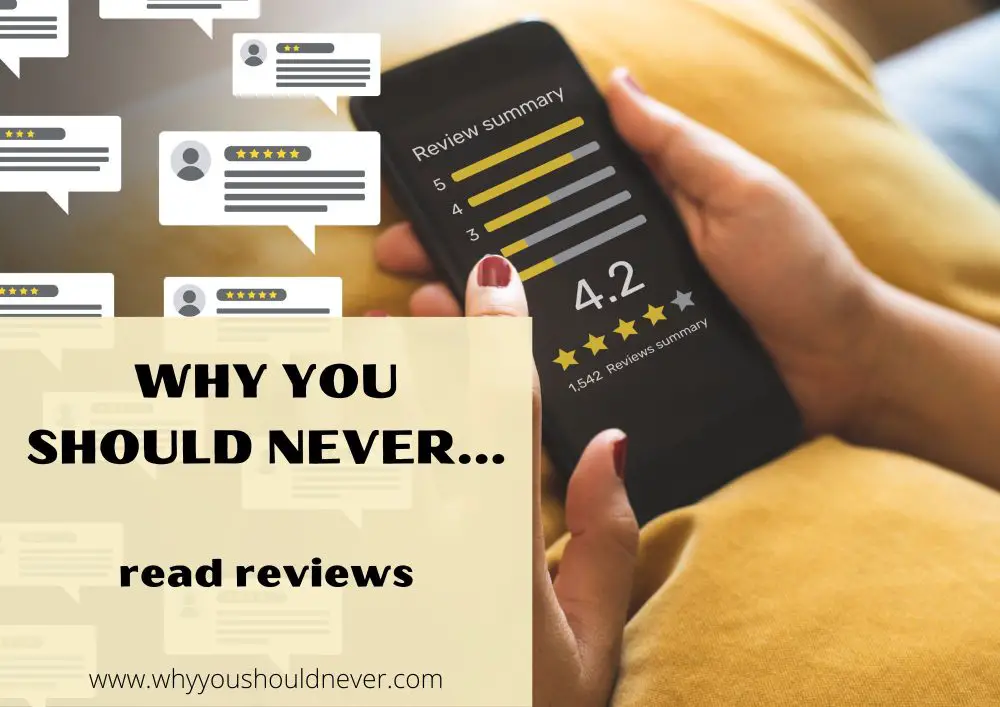![]()
Why You Should Never Read Reviews
Reviews, reviews, reviews. They’re everywhere you look – on Amazon, Yelp, Goodreads, and more. But the question we need to ask ourselves is: do we really need to read them?
I mean, sure they provide valuable insight into products or services, but have you ever thought about the negative impact reading too many reviews can have on us?
In this post, we’ll look at some of the reasons why you might want to hold off on reading reviews for the next product or service you’re thinking about buying or using.
12 reasons why you shouldn’t read reviews
1. They’re often biased
Let’s face it, people tend to write reviews when they feel very strongly about a product or service. This means that you’re more likely to encounter negative reviews from disgruntled customers than positive ones from satisfied ones.
If a user is having a bad day, this can and often does impact the way they review a product, even if said product didn’t cause their bad mood.
2. They can ruin surprises
If you read too many reviews before trying something new (like a movie or book), you’ll find yourself spoiling all the good parts ahead of time! It’s better to go in with an open mind and no expectations rather than having everything ruined by other people’s opinions.
3. You’ll become more indecisive
When faced with countless options online or in stores, reading too many reviews can sometimes lead to analysis paralysis – where we become overwhelmed by information and unable to make decisions as easily as we normally would.
This is also pretty stressful and can lead to you not making any purchase.
4. People can exaggerate their claims
Some reviewers want their voice heard above others even if it means exaggerating the truth slightly, which makes them unreliable sources of information on products/services.
5. We don’t know who’s behind the review
The anonymity offered by online platforms allows anyone – including competitors – to write fake reviews about any given product/service, creating confusion among consumers who rely on feedback left behind by such individuals.
Sabotage is a real problem in the marketing space. It’s not unheard of for competitors to hire people to 1-star bomb another competitor’s products, even going as far as recommending their own products as better alternatives. Scandalous!
6. Reviews can be outdated
In the fast-paced world we live in, products and services are updated and changed quickly. This means that reviews from a few years ago may no longer be relevant to what you’re currently interested in.
We see this most often when a company brings out a newer, more improved version of a product under the same name and details. As nothing ever really disappears from the Internet, those old reviews are still there for everyone to see, despite their irrelevance.
7. We all have different tastes
Just because someone else didn’t like a product or service doesn’t mean you won’t enjoy it. We all have unique preferences and experiences that shape our opinions, so reviews won’t necessarily give a good indication of how you’ll feel about something. It’s important to remember that what works for someone else may not work for you.
8. Fraudulent positive reviews are abundant
Sadly, there are people out there who fraudulently praise undeserving products/services. Whether they’re trying to promote their own product, or even if they’re paid by someone else to write a review, these fraudulent reviewers can skew the overall rating and make it difficult to know what’s real.
You could end up buying a piece of junk based on glowing, fake reviews.
9. You might miss out on discovering hidden gems
If you only rely on popular products with lots of positive reviews, you might completely overlook lesser-known items that could be perfect for your needs! Sometimes disregarding the reviews and buying on a whim is what helps us discover new things we’ll love.
10. It’s time-consuming
Let’s be honest, reading reviews takes time. It’s not just about reading the review itself but also sifting through dozens or even hundreds of them to get a clear picture. Time is precious, and sometimes it’s better spent doing something else, like, for example, actually taking a chance on the product and seeing for yourself!
11. People are dumb!
Okay, maybe that’s a bit harsh. But let’s face it – not everyone who writes reviews is an expert on the subject matter. Sometimes people can be misinformed or simply wrong in their assessments.
I’ve lost count of the amount of times I’ve read 1-star reviews from people who simply didn’t know how to operate the product. Nothing wrong with the product itself.
Don’t let someone else’s lack of knowledge sway you from trying something you might enjoy.
12. You’ll become too reliant on them
Reading reviews can be helpful, but it’s important to remember that they’re just one piece of the puzzle. If you rely too heavily on reviews, you might start feeling like you can’t make any decisions without them! It’s important to trust your own judgment and take a chance every now and then.
As with any opinion and piece of advice, take it with a grain of salt. While reviews can provide valuable insight into products and services, they’re not the be-all and end-all.
Don’t let them dictate your decisions or sway you too much. Your own judgment is just as valuable, if not more. So go ahead and try that new product or service with an open mind. You might be pleasantly surprised by what you find.
